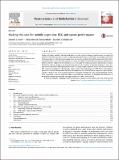Files in this item
Making the case for mobile cognition : EEG and sports performance
Item metadata
| dc.contributor.author | Park, Joanne L. | |
| dc.contributor.author | Fairweather, Malcolm M. | |
| dc.contributor.author | Donaldson, David I. | |
| dc.date.accessioned | 2019-11-07T13:30:06Z | |
| dc.date.available | 2019-11-07T13:30:06Z | |
| dc.date.issued | 2015-05 | |
| dc.identifier | 262819906 | |
| dc.identifier | f33da5c4-257e-4f31-93c8-19bbe66b5e7d | |
| dc.identifier | 84924751516 | |
| dc.identifier | 25735956 | |
| dc.identifier.citation | Park , J L , Fairweather , M M & Donaldson , D I 2015 , ' Making the case for mobile cognition : EEG and sports performance ' , Neuroscience and Biobehavioral Reviews , vol. 52 , pp. 117-130 . https://doi.org/10.1016/j.neubiorev.2015.02.014 | en |
| dc.identifier.issn | 0149-7634 | |
| dc.identifier.uri | https://hdl.handle.net/10023/18880 | |
| dc.description | This work was funded by the Sportscotland Institute of Sport. | en |
| dc.description.abstract | In the high stakes world of International sport even the smallest change in performance can make the difference between success and failure, leading sports professionals to become increasingly interested in the potential benefits of neuroimaging. Here we describe evidence from EEG studies that either identify neural signals associated with expertise in sport, or employ neurofeedback to improve performance. Evidence for the validity of neurofeedback as a technique for enhancing sports performance remains limited. By contrast, progress in characterizing the neural correlates of sporting behavior is clear: frequency domain studies link expert performance to changes in alpha rhythms, whilst time-domain studies link expertise in response evaluation and motor output with modulations of P300 effects and readiness potentials. Despite early promise, however, findings have had relatively little impact for sports professionals, at least in part because there has been a mismatch between lab tasks and real sporting activity. After selectively reviewing existing findings and outlining limitations, we highlight developments in mobile EEG technology that offer new opportunities for sports neuroscience. | |
| dc.format.extent | 14 | |
| dc.format.extent | 2482373 | |
| dc.language.iso | eng | |
| dc.relation.ispartof | Neuroscience and Biobehavioral Reviews | en |
| dc.subject | Alpha | en |
| dc.subject | EEG | en |
| dc.subject | Expertise | en |
| dc.subject | Mobile cognition | en |
| dc.subject | Neural efficiency | en |
| dc.subject | Neurofeedback | en |
| dc.subject | P300 | en |
| dc.subject | Readiness potentials | en |
| dc.subject | Sports performance | en |
| dc.subject | RC0321 Neuroscience. Biological psychiatry. Neuropsychiatry | en |
| dc.subject | BF Psychology | en |
| dc.subject | Neuropsychology and Physiological Psychology | en |
| dc.subject | Cognitive Neuroscience | en |
| dc.subject | Behavioral Neuroscience | en |
| dc.subject.lcc | RC0321 | en |
| dc.subject.lcc | BF | en |
| dc.title | Making the case for mobile cognition : EEG and sports performance | en |
| dc.type | Journal item | en |
| dc.contributor.institution | University of St Andrews. School of Psychology and Neuroscience | en |
| dc.identifier.doi | 10.1016/j.neubiorev.2015.02.014 | |
| dc.description.status | Peer reviewed | en |
This item appears in the following Collection(s)
Items in the St Andrews Research Repository are protected by copyright, with all rights reserved, unless otherwise indicated.

